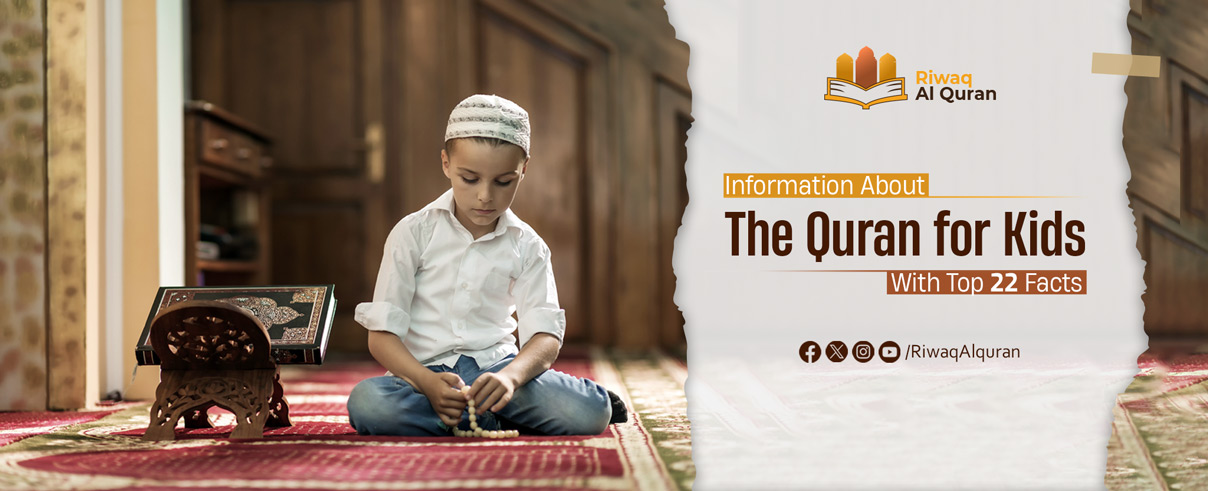Introducing children to the Quran and nurturing their love for it is a sacred responsibility for Muslim parents and educators alike. In this guide, we delve deeper into some basic information about Quran for kids and its importance in our everyday lives.
Inform your kids from the Quran’s celestial origins to timeless guidance, the Quran weaves a tapestry of faith and knowledge. Its verses, a melody of science and spirituality, resonate through centuries, bridging cultures and kindling curiosity.
Through tales and playful exploration, parents and mentors sculpt a path where children dance with the Quran’s wisdom, crafting a bond that nourishes their souls and connects them to a global community of believers.
Drawing from the wisdom of Prophet Muhammad and modern educational practices, we discuss fruitful effective strategies and insights for making it accessible and enjoyable and explore various tactics to enrich children’s Quranic learning experience.
Table of Contents
Quran Facts For Kids
Introducing children to interesting facts about the Quran can pique their curiosity and deepen their appreciation for this sacred scripture. Here are some fascinating insights tailored for kids:
1. Divine Revelation:
The Quran is the literal word of Allah as revealed to the Prophet Muhammad over 23 years through Angel Jibreel. This miraculous transmission makes the Quran unique, emphasizing its divine origin and significance.
2. Eternal Preservation:
Unlike other ancient scriptures, the Quran has been meticulously preserved in its original form since its revelation over 1,400 years ago. This remarkable feat highlights the Quran’s timeless relevance and authenticity, inspiring awe and admiration among believers.
3. Gateway to Paradise:
The Quran is regarded as a guidebook for attaining success in this life and the Hereafter. Believers who adhere to its teachings and live righteous lives are promised immense rewards in Paradise, motivating them to strive for excellence in all aspects of their existence.
4. Comprehensive Guidance:
The Quran offers guidance on every aspect of life, addressing topics ranging from faith and morality to social justice and governance. Its teachings provide practical solutions to contemporary challenges, empowering believers to lead fulfilling and righteous lives.
5. Global Influence:
The Quran has had a profound impact on human history, shaping the lives of billions of people around the world. Its universal message of peace, justice, and compassion transcends cultural and geographical boundaries, uniting humanity in its shared reverence for the divine word of Allah.
6. Scientific Miracles:
The Quran contains numerous verses that align with modern scientific discoveries, despite being revealed over a millennium ago. Topics such as embryology, astronomy, and the water cycle are mentioned in the Quran with remarkable accuracy, sparking curiosity and admiration among young minds.
7. Recitation Artistry:
Reciting the Quran is considered an art form in Islamic culture, with skilled reciters known as Qaris captivating audiences with their melodious voices and precise pronunciation. Listening to Quranic recitations can evoke feelings of peace, awe, and spiritual upliftment.
8. Memorization Achievement:
Many Muslims, both young and old, undertake the noble endeavor of memorizing the entire Quranwith Tajweed. This feat requires dedication, discipline, and perseverance, and those who accomplish it are revered within their communities.
By sharing these interesting facts about the Quran with children, parents can ignite their curiosity and instill a deep appreciation for this timeless scripture, fostering a lifelong connection to their faith and heritage.


All About the Quran for Kids Tips:
Since we now know different interesting facts and information about Quran for kids, the following tactics would help you a lot during your children’s Quran learning:
1. Utilizing Inspiring Quranic Stories:
One of the most captivating aspects of the Quran is its rich tapestry of stories. From the tales of prophets to parables of wisdom, Quranic narratives offer valuable lessons and insights for children. Incorporating these stories into children’s learning through bedtime readings, storytelling sessions, or engaging Islamic cartoons can captivate their imagination and deepen their understanding of Quranic teachings.
2. Making Quran Learning Fun and Interactive:
Children thrive in environments that are interactive and enjoyable. To make Quran learning a delightful experience for kids, educators and parents can employ creative methods such as educational games, interactive apps, or role-playing activities. By integrating fun elements into Quranic lessons, children are more likely to remain engaged and retain what they learn.
At Riwaq Al Quran, we infuse Quran learning with excitement and engagement by integrating interactive games, educational apps, and hands-on activities into our curriculum. Through these innovative approaches, we foster a deep connection to the Quran, empowering children to explore its teachings with enthusiasm and curiosity.
3. Leading by Example:
As the saying goes, “Actions speak louder than words.” Parents and educators play a pivotal role in modeling Quranic values and behaviors for children. By regularly reciting the Quran themselves and demonstrating reverence for its teachings, adults can inspire children to emulate their devotion and commitment to Allah’s word.
4. Encouraging and Praising Children’s Efforts:
Positive reinforcement is key to nurturing children’s confidence and motivation. Acknowledging and praising children’s efforts in Quranic learning, whether it’s memorization, recitation, or understanding, can boost their self-esteem and drive to excel. A word of encouragement from parents or teachers can go a long way in fostering a love for the Quran in children’s hearts.
5. Adopting a Gentle and Patient Approach:
Every child has their own pace of learning, and it’s essential to respect their individual journey. Avoid pressuring or forcing children to spend long hours studying the Quran, as it may lead to feelings of resentment or disinterest. Instead, adopt a patient and compassionate approach, offering support and guidance as children navigate their Quranic education.
6. Establishing Consistent Learning Routines:
Consistency is key to effective Quranic learning. Establishing a daily routine for Quran recitation, memorization, or Tajweed practice helps children develop discipline and commitment to their studies. By carving out dedicated time slots for Quranic activities, parents can create a conducive environment for children to flourish in their spiritual journey.
7. Embracing the Power of Repetition:
Repetition is a cornerstone of learning, especially when it comes to memorizing Quranic verses and surahs. Encourage children to recite short surahs repeatedly and listen to Quranic recitations regularly to reinforce their understanding and retention. Over time, consistent repetition will deepen children’s familiarity with the Quranic text and enhance their proficiency.
At Riwaq Al Quran, we recognize the importance of repetition in Quranic learning. Through our structured programs, we encourage children to engage in regular recitation of short surahs and listen to Quranic recitations consistently, fostering a lifelong connection to the divine words of Allah.
Read more about: Top 8 Tajweed Books in English For Kids
Why It’s so Important To Teach Quranic Information for kids
Quranic education holds profound significance in the lives of Muslim children, shaping their spiritual, moral, and intellectual development. Here’s a deeper exploration of its importance:
1. Spiritual Foundation:
Introducing children to the Quran from a young age establishes a strong spiritual foundation for them. The Quran is not merely a book but the literal word of Allah, guiding individuals on the path of righteousness and piety. By familiarizing children with the Quranic verses and teachings, parents and educators instill in them a profound sense of connection to their faith and a deep reverence for Allah.
2. Moral Guidance:
The Quran serves as a timeless source of moral guidance, offering principles of compassion, justice, and integrity. Teaching children the stories of prophets, the importance of honesty, and the virtues of patience and gratitude, the Quran shapes their ethical framework and instills values that guide their conduct in everyday life. Through Quranic education, children learn to differentiate between right and wrong, developing a strong moral compass that influences their actions and decisions.
3. Cultural Identity:
The Quran is not only a religious scripture but also a cornerstone of Islamic culture and heritage. By immersing children in the study of the Quran, parents and educators impart to them a sense of cultural identity and belonging. Understanding the Quranic language, traditions, and rituals fosters a deeper appreciation for Islamic heritage and strengthens children’s connection to their cultural roots.
4. Intellectual Stimulation:
Engaging with the Quranic text stimulates children’s intellectual curiosity and cognitive development. Exploring the complex themes, narratives, and linguistic nuances of the Quran encourages critical thinking, analytical skills, and linguistic proficiency. Through Quranic education, children enhance their comprehension, memory, and cognitive abilities, laying the groundwork for lifelong learning and intellectual growth.
5. Spiritual Growth:
Quranic education is integral to nurturing children’s spiritual growth and fostering a profound relationship with Allah. Through memorization, recitation, and reflection on Quranic verses, children develop a deep sense of spirituality and inner peace. The Quranic teachings provide solace, guidance, and strength during times of difficulty and adversity, nurturing children’s resilience and faith in Allah’s wisdom and mercy.
6. Community Cohesion:
Studying the Quran fosters a sense of community cohesion and solidarity among Muslim children. Quranic education often takes place in communal settings such as mosques, Islamic schools, or online learning platforms, where children interact with peers and mentors. These shared experiences create bonds of friendship, mutual support, and collective responsibility, enriching children’s social and emotional development within the broader Muslim community.
In essence, Quranic education is not just about imparting religious knowledge; it’s about nurturing holistic growth and development in children, fostering their spiritual, moral, intellectual, and social well-being. By embracing the importance of Quranic education for kids, parents lay the groundwork for a generation of empowered, ethical, and spiritually grounded individuals who embody the teachings of Islam in their lives.
Join Us and Enroll in the Best Quran for Kids Course!
In conclusion, introducing children to the Quran and nurturing their love for it is a sacred duty for Muslim parents and educators. Through patience, consistency, and leading by example, we can instill a deep reverence for the Quran in children’s hearts, laying the groundwork for a lifelong connection to Allah’s divine word.
Riwaq Al Quran Institute is a pioneer in teaching Quran for kids as we offer you the best Online Quran Course for Kids. In this course, our skilled and well-trained teachers use effective methods and provide an exciting atmosphere to nurture the love for the Quran in the kids’ hearts.
We offer several courses such as:
- Online courses for kids.
- Online Quran classes for kids and adults.
- Online Arabic courses
- Online Ijazah courses
- Online Islamic Studies courses.
Here are a sample of our set of Quran Courses that will be helpful for you:
- Online Tafseer Course: Delve into Quranic meanings with our insightful online Tafseer course.
- Noorani Qaida Online: Learn Quranic basics efficiently through our Noorani Qaida online program.
- Online Quran Recitation Course: Enhance Quranic recitation skills through our expert-led online course.
- Online Tajweed Classes: Master Tajweed rules for beautiful Quranic recitation in online classes.
- Quran Memorization Online Course: Memorize the Quran effectively with our specialized online memorization course.
- Online Qirat Course: Explore diverse Qirat styles with our comprehensive online Qirat course.
- Online Quran Classes for Kids: Nurture a love for the Quran in kids through interactive online classes.


Conclusion:
Introducing children to the Quran opens doors to a world of wonder and wisdom. The Quran, revealed over 23 years to Prophet Muhammad by Angel Jibreel, stands unique in its divine origin and preservation, offering guidance for both this life and the Hereafter.
Its impact spans centuries, transcending cultural and geographical boundaries, while its verses reflect scientific accuracy and inspire spiritual devotion. By incorporating engaging methods, such as storytelling and interactive learning, parents and educators can nurture a deep connection to the Quran, fostering spiritual, moral, and intellectual growth in children and strengthening their bond with Islamic heritage and community.


































